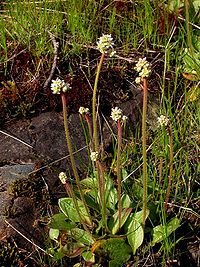Difference between revisions of "Micranthes integrifolia"
(→Propagation) |
|||
| Line 51: | Line 51: | ||
==Propagation== | ==Propagation== | ||
| − | Can be propagated by seed, division or cuttings. | + | Can be propagated by seed, division or cuttings.</br> |
| − | + | Seed should be planted in winter and barely covered. Germination takes place in 1 to 3 months at 16-21°C</br> | |
| − | Seed should be planted in winter and barely covered. Germination takes place in 1 to 3 months at 16-21°C | + | Division should be done after flowering.</br> |
| − | + | Cuttings in should be taken in late summer.<ref> | |
| − | Division should be done after flowering. | + | |
| − | + | ||
| − | Cuttings in should be taken in late summer. | + | |
==Photo Gallery== | ==Photo Gallery== | ||
Revision as of 11:40, 7 May 2012
Contents
Micranthes integrifolia
Micranthes integrifolia, commonly known as whole-leaf saxifrage or swamp saxifrage is a perennial herb in the Saxifragaceae family.
Synonyms:
- Saxifraga integrifolia
Taxonomy
Kingdom: Plantae – Plants
Subkingdom: Tracheobionta – Vascular plants
Superdivision: Spermatophyta – Seed plants
Division: Magnoliophyta – Flowering plants
Class: Magnoliopsida – Dicotyledons
Subclass: Rosidae
Order: Rosales
Family: Saxifragaceae – Saxifrage family
Genus: Micranthjes – saxifrage
Species: Micranthes integrifolia Hook. – wholeleaf saxifrage
Description
A somewhat hairy perennial, the leafless flowering stems usually growing singly from a rhizome, reaching 10-30 cm in height. Leaves form a basal rosette with no cauline leaves. The blades are 2-5 cm long, narrowly rhombic to rhombic-ovate, narrowed gradually to short, broad petioles. Prominent marginal hairs line the leaves and are rusty-woolly on the lower surface.
The inflorescence is a short, compact panicle, subtended by a leafy, rusty-woolly bracts. The calyx is broadly conic, the 5 lobes oblong-lanceolate, 1-2 mm. long and reflexed. Individual flowers have 5 white, obovate petals, 1.5-3 mm. long, at least half as broad as long. Stamens number 10 and are short, awl-shaped.[1]
Bloom Period
Late March - July
Distribution
West side of the Cascades, British Columbia to Lincoln County, Oregon, and in the Columbia River Gorge
Habitat
Prairies, grassy slopes and vernally moist areas, sea level to subalpine
Uses
used ornamentally in rock gardens
Propagation
Can be propagated by seed, division or cuttings. Seed should be planted in winter and barely covered. Germination takes place in 1 to 3 months at 16-21°C Division should be done after flowering.
Cuttings in should be taken in late summer.[2]- ↑ http://biology.burke.washington.edu/herbarium/imagecollection.php?Genus=Saxifraga&Species=integrifolia Burke Museum University of Washington
- ↑
Photo Gallery
References
References & Notes
- ↑ http://biology.burke.washington.edu/herbarium/imagecollection.php?Genus=Saxifraga&Species=integrifolia Burke Museum University of Washington
- ↑
Photo Gallery
References
References & Notes
<references/>
Seed
Abbreviation: MIIN
Average Measurement: 0.8 x 0.4 x 0.3
Measurement Range: L: 0.6 – 0.8, W: 0.2 – 0.5, D: 0.2 – 0.4
Features
Shape: Seed narrowed at hilum and opposite apex, forming points. Middle between hilum and opposite apex rounded. Hilum is puckered.
Color: Seeds golden brown, and slightly darker at hilum.
Surface: Seeds bumpy and longitudinally ridged. Seeds are slightly lustrous.
Seed
Abbreviation: MIIN
Average Measurement: 0.8 x 0.4 x 0.3
Measurement Range: L: 0.6 – 0.8, W: 0.2 – 0.5, D: 0.2 – 0.4
Features
Shape: Seed narrowed at hilum and opposite apex, forming points. Middle between hilum and opposite apex rounded. Hilum is puckered.
Color: Seeds golden brown, and slightly darker at hilum.
Surface: Seeds bumpy and longitudinally ridged. Seeds are slightly lustrous.


